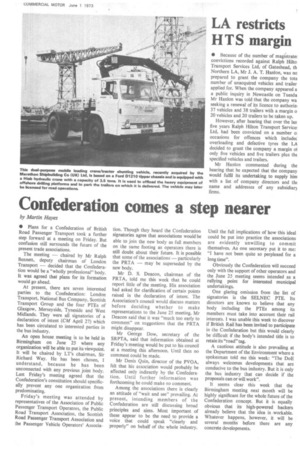Confederation comes a step nearer
Page 15

If you've noticed an error in this article please click here to report it so we can fix it.
by Martin Hayes
• Plans for a Confederation of British Road Passenger Transport took a further step forward at a meeting on Friday. But confusion still surrounds the future of the present trade associations.
The meeting — chaired by Mr Ralph Bennett, deputy chairman of London Transport — decided that the Confederation would be a "wholly professional" body. It was agreed that plans for its formation would go ahead.
At present, there are seven interested parties to the Confederation: London Transport, National Bus Company, Scottish Transport Group and the four PTEs of Glasgow, Merseyside, Tyneside and West Midlands, They were all signatories of a declaration of intent (CM April 27) which has been circulated to interested parties in the bus industry.
An open house meeting is to be held in Birmingham on June 25 where any organization will be able to put its viewpoint. It will be chaired by LT's chairman, Sir Richard Way, He has been chosen, I understand, because he has been unconnected with any previous joint body. Last Friday's meeting agreed that the Confederation's constitution should specifically prevent any one organization from predominating.
Friday's meeting was attended by representatives of the Association of Public Passenger Transport Operators, the Public Road Transport Association, the Scottish Road Passenger Transport Association and the Passenger Vehicle Operators' Associa
tion. Though they heard the Confederation signatories agree that associations would be able to join the new body as full members on the same footing as operators there is still doubt about their future. It is possible that some of the associations— particularly the PRTA — may be superseded by the new body.
Mr D. S. Deacon, chairman of the PRTA, told me this week that he could report little of the meeting. His association had asked for clarification of certain points raised in the declaration of intent. The Association's council would discuss matters before deciding whether to make representations to the June 25 meeting. Mr Deacon said that it was "much too early to comment" on suggestions that the PRTA might disappear.
Mr George Dow, secretary of the SRPTA, said that information obtained at Friday's meeting would be put to his council at a meeting this afternoon. Until then no comment could be made.
Mr Denis Quin, director of the PVOA, felt that his association would probably, be affected only indirectly by the Confederation. Until further information was forthcoming he could make no comment.
Among the associations there is clearly an attitude of "wait and see" prevailing. At present, intending members of the Confederation are still discussing broad principles and aims. Most important of these appear to be the need to provide a voice that could speak "clearly and properly" on behalf of the whole industry. Until the full implications of how this ideal could be put into practice the associations are evidently unwilling to commit themselves. As one secretary put it to me: "I have not been quite so perplexed for a long time".
Obviously the Confederation will succeed only with the support of other operators and the June 25 meeting seems intended as a rallying point for interested municipal undertakings.
One glaring omission from the list of signatories is the SELNEC PTE. Its directors are known to believe that any body including the PTEs among its members must take into account their rail interests. I was unable this week to discover if British Rail has been invited to participate in the Confederation but this would clearly be difficult if the body's intended title is to retain its "road" tag.
A cautious attitude is also prevailing at the Department of the Environment where a spokesman told me this week: "The DoE always welcomes developments that are conducive to the bus industry. But it is only the bus industry that can decide if the proposals can or will work".
It seems clear this week that the Birmingham meeting next month will be highly significant for the whole future of the Confederation concept. But it is equally obvious that its high-powered backers already believe that the idea is workable. Whatever happens, however, it will be several months before there are any concrete developments.




































































































